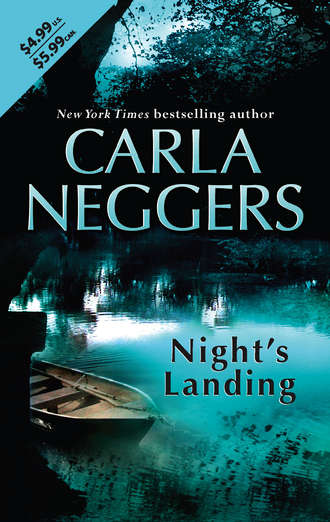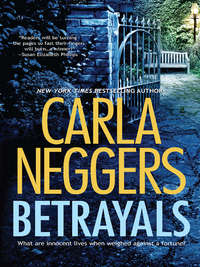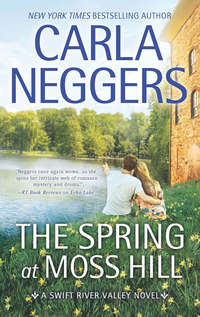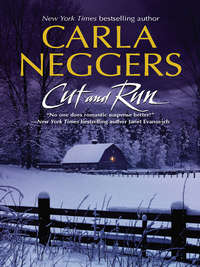
Полная версия
Night's Landing
He hadn’t called the sister back. He couldn’t—her number was on Rob’s cell phone.
Someone must have contacted her by now.
Twins. Nate couldn’t remember Rob ever saying much about her.
The image started replaying itself, like a movie, but Nate pulled himself out of it and sat up straighter. He tried to smile at his family. “I feel like Dorothy in The Wizard of Oz. All I need is Toto to show up. They let you all in here at once?”
His white-haired uncle, built like Nate, grunted. “It’s Antonia’s fault. She told your doctors you could handle all of us.”
Nate eyed his out-to-there pregnant sister, wearing what at a guess was one of her husband’s shirts. “I can handle the stress, but can you, Antonia? You look like you’re going to have that baby any second.”
“Not for a few more weeks.” Always the doctor, she picked up his chart and scanned it, sighing. “How’s your arm?”
“Anesthetized. I can’t feel a thing. Rob Dunnemore’s the one in rough shape.”
She nodded. “So I understand.”
Tyler North, Carine’s air force pararescueman husband, spoke up. “A wound like that. Chances are he’s either going to make a full recovery or he’s going to die. There’s not much in between.”
Antonia winced. “Ty, for God’s sake—”
But North wasn’t one to pussyfoot around. They’d all been friends since childhood, and Nate appreciated his straightforward assessment. Carine leaned over his bed, the stress of the past hours evident in her drawn, pale look, in the blue eyes all three siblings shared. Carine was the youngest. Her auburn hair was lighter than Antonia’s, Nate’s own hair so dark the red streaks were barely noticeable. Carine had been shot at. She knew what it was like. “I’m glad you weren’t killed,” she whispered.
“Me, too.”
Hank Callahan, Antonia’s husband, slipped an arm around his wife and eyed Nate. “Is there anything I can do?” Once a helicopter rescue pilot and now a junior senator from Massachusetts, Hank, like the rest of them, was used to taking action.
“Get me a shirt. I feel like an idiot in this gown.”
Antonia hissed. “I knew you’d be impossible. Didn’t I tell you, Gus?”
Their uncle stared out the window with its view of the street. He was in jeans and a hiking jersey. He was one of the best outfitters in the White Mountains, content to stay home in Cold Ridge and hike, cook and redecorate the house he’d inherited from his older brother. But Gus had been shot at more than any of them. He’d served a year in combat in Vietnam before coming home, only to end up raising his orphaned nieces and nephew.
He glanced back at Nate. “Why don’t you drive home with me? The mountain air’ll do you good.”
Nate shook his head. “Last time I was home, you served orange eggs.”
“They’re not that orange. You’re just used to New York eggs.”
“I’m used to yellow eggs.”
“It’s what Moon feeds them.”
Moon. Moon Solaire. She was a newcomer to Cold Ridge. People called her the egg lady because she had dozens of chickens in a variety of breeds. She and Gus had been seeing each other for a couple of months. “Moon’s really into chickens, isn’t she?”
Nate was starting to feel sluggish and achy, some of his earlier adrenaline rush wearing off. Or maybe now that his family was there, he could allow himself a letdown.
“Who knew there were that many different kinds of chickens?” Gus said. “I thought she might be one of your people, with a fake name like Moon Solaire.”
“What do you mean, one of my people?”
Gus shrugged. “You know, some lowlife you’re protecting so they can testify against some bigger lowlife you’re not protecting.”
He meant WITSEC. The Witness Security Program. Gus’s rendition of its mission of protecting government witnesses and their dependents was oversimplified and biased, but Nate was in no mood to argue. “Not all protected federal witnesses are criminals, and I’d be surprised if we ever gave one a name like Moon Solaire—”
“I know, I know. She made it up. Ex-hippie. Real name’s Linda.”
Nate didn’t know about the ex.
Antonia touched their uncle’s arm. “We should go.”
Gus didn’t budge, his blue eyes pinned on his nephew. With just a thirteen-year age difference between them, Gus was in some ways like an older brother to Nate, in other ways like a father. “I turned on CNN before the marshals called, and I knew it was you. I’m telling you. I just knew.”
“I’m sorry, Gus. It’s my job—”
“It’s not your job to get shot by some asshole in Central Park.”
Antonia groaned. “Gus! Now’s not the time.” She shifted her attention to her older brother. “You’ll do what your doctors say, won’t you? And don’t be stingy with the pain medication. Take what you need.”
“Got it.”
She wasn’t convinced. “You do not. You’re itching to get out of this bed and go find who shot you.”
“And you wouldn’t be?”
She didn’t answer. No one did, because his uncle, his sisters and the men they’d married were all cut from the same cloth when it came to waiting patiently for others to do what they wanted to do themselves. They simply didn’t.
Nate felt bad about what they’d been through today. He knew what it was like—he remembered how he’d reacted when he learned about the close calls his sisters and brothers-in-law had had last fall. “Where are you guys staying tonight?”
No one wanted to answer that one, either, but finally Ty did. “Your place. Hank and I are heading out tonight, but your uncle and sisters are staying. Gus took a lasagna out of the freezer and brought it down.”
The thought of Gus’s rich, uncompromising lasagna made Nate nauseous. Spending the night in the hospital suddenly didn’t look so bad. Armed guards and medical types hovering over him—or his family.
When his nurse entered the room, his entourage retreated, but Nate could hear them out in the hall. If his bandaged arm hadn’t forced the reality of his situation to sink in, their presence did.
He’d been shot.
He’d damn near been killed.
And Rob Dunnemore—it could go either way with him.
After the nurse left, Nate tried to get the deputy at his door to find who he needed to see about checking himself out.
No dice.
He’d just have to wait.
Four
Juliet Longstreet made herself dump the last of her latte in the water fountain next to the elevator that had dropped her off on Rob and Nate’s floor. It was her seventh latte of the day, and she had acid burning up her throat. Not a good sign.
She ran the water to clean the drain but didn’t take a sip. She didn’t like drinking out of hospital water fountains.
She didn’t like anything about this whole damn day.
The chief deputy had turned the care and feeding of Rob Dunnemore’s sister over to her, probably because they were both female and blond. Any comparison ended there. Sarah Dunnemore was just about the prettiest woman Juliet had ever actually met in person. Long honey-colored hair streaked with pale blond highlights, gray eyes, slim build, elegant even in her jeans and dark gray silk twin set. She wore two delicate little rings on her fingers. Juliet still had Band-Aid scum on her thumb after jamming it in the weight room. She was a lot taller. And her hair. Nobody could do a thing with it. A friend had dragged her to a trendy New York salon, and she’d learned about hair wax and identified every one of her cowlicks—she’d spent a fortune and looked good for about three days.
Christ.
Rob was in there dying, and she was thinking about her hair.
“Dr. Dunnemore?” Faking a calm professionalism, Juliet pretended her throat wasn’t burning and motioned toward the waiting room recently vacated by the Winter family. “Let’s go in there. It’ll be quiet.”
It seemed to take a few seconds for her words to sink it, but Sarah Dunnemore nodded and mumbled something about calling her by her first name, then walked into the little room. Juliet had already kicked out any loitering law enforcement types. All the armed marshals in the halls were enough to agitate her, never mind a Ph.D. who’d just learned her twin brother had been seriously wounded in a sniper attack. A New York hospital on a good day was hard to take. This was not a good day.
Juliet had no idea what to say. None.
“Can I get you anything?” she asked finally.
Sarah shook her head. “When can I talk to Rob’s doctor?”
“Soon. Your brother’s just out of surgery.”
The gray eyes were steady, but Juliet could see the fear in them and realized that Sarah couldn’t speak.
“He’s holding his own,” Juliet said, guessing Sarah’s question. “I understand that the next twenty-four hours are critical.”
Sarah took a moment to digest Juliet’s words, then breathed in through her nose and nodded. “What about the deputy who was with him? Nate Winter. How is he?”
“He’s fine. Someone forgot to chain him to his bed, so he got out of here about an hour ago.” It was seven now. Juliet had returned his weapon to him and, like everyone else, futilely told him to go home and take it easy. “The bullet that hit him just grazed his upper arm. He was never in surgery.”
“That’s good,” Sarah said absently. She remained on her feet—she was wearing sandals that would not be adequate for the miserable weather New York was having. “I don’t know much about guns. Shots like that—would they be difficult shots? Do you think the shooter meant to kill my brother and Deputy Winter outright?”
“No answers yet. FBI’s investigating.”
“There must be witnesses. Central Park at midday—someone must have seen something. Are there places for a shooter to hide? How would he escape? If the police arrived quickly—”
“Look, have a seat.” The chief deputy had warned Juliet to try to keep Rob’s sister from dwelling on, dissecting, the shooting. It wasn’t good for her. It wasn’t good for any of them. “At least let me get you a cup of coffee.”
“I don’t drink coffee, but thank you. I’m okay. I just want to see my brother.”
“I know, but it might not be tonight.” He was in intensive care, on a respirator. Juliet didn’t want to be the one to tell Sarah Dunnemore that. “Let’s just wait and you can talk to his doctor.”
Sarah nodded, saying nothing, and lowered her head, fiddling with one of her rings, as if to keep Juliet from seeing that she was on the verge of tears.
Hell. Juliet took in a steadying breath. Now her stomach was burning. She had no idea what to say to this woman. “Where are you staying?”
“I could stay at Rob’s. I haven’t visited since he was assigned up here, but I could—I’m sure I could get the key.”
“That’s not a good idea, not tonight. FBI could be going through his place for all I know, but you shouldn’t stay there on your own. Forget about it, okay? Trust me. You can stay at my place if you don’t mind my fish and plants, or I can book you into a hotel.”
“That’s very nice of you, Deputy—Longstreet, right?”
“Juliet’ll do.”
“Juliet. That’s a pretty name.”
“Yeah.” She smiled. “I used to think I should change it to something meaner sounding.”
Sarah raised her eyes. “You and Rob…” But she trailed off, not finishing.
Juliet understood what she was trying to say. “We used to see each other.”
“Not anymore?”
“No. Not anymore.”
The noise and lights of the city—the crush of people—struck Sarah as oddly reassuring as she and Juliet Longstreet climbed out of the back of the government car that had driven them to the Marriott Marquis in the heart of Times Square. It wasn’t that far from the hospital, but Rob’s bosses didn’t want her walking. They’d made that clear. They didn’t say it was because a sniper was on the loose in the city and they were afraid Juliet or even Sarah might be his next target—they said it was because Sarah was obviously exhausted, emotionally wrung out and on edge.
But they all were tired and on edge, she thought. A steady stream of law enforcement and political types had stopped at the hospital to check on Rob and Nate and to greet her, to offer to do whatever they could for her. She’d sensed not only their concern for the injured officers, but their worry about the situation itself. The chief deputy, the district U.S. marshal, the FBI agent leading the investigation, the FBI assistant director in charge of the New York FBI office, the mayor—they’d all attended the news conference that had preceded the shooting. The shooter could have been after one of them instead and seized on Rob and Nate as a second choice, targets of opportunity—get someone, anyone, who’d been at the news conference.
The bottom line was clear. Two federal agents had been gunned down in daylight in Central Park, and the gunman was still at large.
“I’ll check you in,” Juliet said, briskly leading the way up the elevators to the eighth-floor lobby of the huge conference hotel.
She’d insisted on carrying Sarah’s bag, saying it was part of the job. Sarah wanted to ask about Juliet’s relationship with her brother, who’d only mentioned in one e-mail that he’d been seeing another deputy and it hadn’t worked out—but Juliet had cut off that topic.
When they arrived at the lobby, Sarah waited off to the side while Juliet checked her in. She’d never seriously considered imposing on her marshal escort—she liked the anonymity of the large hotel. She needed time to herself. Space. Rob’s doctors were guarded but not discouraging in their assessment of her brother’s condition. He’d lost a lot of blood but the surgery had gone well. The bullet could have done far more damage than it had, although the damage it had done was considerable. They’d watch him closely for complications from blood loss, a recurrence of bleeding, infection—he had a long way to go.
Without her having to plead, his doctors had allowed her peek in on him.
He was intubated and attached to a ventilator, hooked up to a myriad of IVs and tubes and unconscious. But he was alive, and that was what Sarah had tried to focus on as she touched him gently on the forehead and told him she was there and would see him in the morning. She hoped that on some subconscious level he could hear her, knew she was rooting for him and he wasn’t alone.
But when she left the I.C.U., she burst into tears and almost threw up. Juliet Longstreet had hesitated, obviously awkward and unsure of what to do, but the chief deputy—Mike Rivera, a stocky rock of a man—stepped forward and maneuvered Sarah into the waiting room.
That was when they all decided she shouldn’t walk alone to her hotel.
Juliet turned from the front desk with a small key folder. “Tenth floor okay?”
“Anything’s fine.”
“Elevators are over here.”
When they reached her room, Juliet used the card key and pushed open the door, then checked out the place, even pulling open the closet and drawers. Sarah caught a glimpse of her weapon, a reminder that her escort was a federal agent on duty. She wasn’t just being kind.
“Place looks clean and safe enough.” Juliet turned from the closet and frowned at Sarah. “You look beat. Take a bath and get some sleep. If there’s any news, someone will call you. Promise.”
Sarah sank onto the bed. Her room was clean and pleasant, a large window overlooking Times Square with its huge, flashing billboards. She was struck by the disconnect between here and her family home in Night’s Landing. Not that long ago, she’d been listening to a mockingbird and drinking tea punch.
She doubted she’d sleep, never mind the flashing billboards and sirens down on the busy New York street.
A cell phone trilled, but it took a moment for Sarah to realize it was hers. She fished it from an outer pocket of her tote bag.
“Sarah—Sarah, honey, it’s Wes.”
Fresh tears welled in Sarah’s eyes at the sound of John Wesley Poe’s familiar, caring voice. “Wes—I’m so glad you called. It’s been an awful day.”
“I know, honey. I heard about Rob. I am so, so sorry.”
“I saw him for a few seconds. He made it out of surgery. That’s a good sign.”
Juliet turned from the window, not hiding that she was listening. Sarah knew she couldn’t possibly explain that she was talking to the president of the United States. Deputy U.S. Marshal Juliet Longstreet’s ultimate boss. Rob’s boss. But to her, he was a friend, a neighbor, a man she’d known and adored all her life.
“Ev and I are thinking of you, praying for both you and Rob,” Wes said. “If there’s anything we can do, please, just say the word.”
“Thank you. Thank you for calling. Just knowing you’re thinking of him makes a difference. He’s—it’s tough, Wes. He’s on a respirator—the bandages—” Her voice faltered. “But I keep telling myself that at least he’s alive. He has a chance.”
“He’s strong, and so are you.” But beneath his soothing words, she heard the undertone of concern and fear, because for all his brilliance and compassion, Wes Poe didn’t know if Rob would live, either. “Where are you now?”
“A hotel in New York.”
“Alone?”
“I have a deputy marshal escort. Wes, don’t worry about me. I’m fine.”
“What about your parents?”
“They’re waiting until morning their time before they decide what to do.”
“God love them. This has to be a parent’s worst nightmare.”
Wes and Evelyn Poe had no children. That it was a political liability was something Sarah had found distasteful. Evelyn had had four miscarriages and stillbirths before an emergency hysterectomy put an end to all hope of giving birth. Sarah remembered how distraught Wes was after that fourth and last loss. He’d come to Night’s Landing alone, so his wife wouldn’t see him mourn, so he could be strong for her when they were together. But even before that terrible day, Sarah had become something of a surrogate daughter to them. In some ways, they’d been more reliable and solid—more available—than her own parents.
“Sarah…the media…” Wes hesitated, a rarity for him. “They’ll zero in on my relationship with your family at some point. Right now, there’s no indication that Rob was targeted because of it.”
Sarah nearly dropped the phone.
Juliet Longstreet took a step toward her, her expression tight, alert.
“Wes!” Sarah choked, gripping the phone. “My God, that never even occurred to me!”
“I’m mentioning it only because it could come up as a theory, and I don’t want you to be blindsided.” The strain in his voice, famous for its ability to soothe yet sound commanding, was evident. “Honey, you just focus on being there for Rob. I’ll worry about the rest of it.”
“Thank you.” She didn’t know what else to say.
“Ev sends her love.”
“I love you both. Thank you for calling.”
After Sarah hung up, Juliet pulled the drapes. “Do you mind if I ask who that was?” she asked.
Sarah’s heart thumped painfully in her chest. Her eyes felt squeezed. In Scotland, for weeks—for most of John Wesley Poe’s first months in office—she hadn’t had to deal with the reality that her closest and oldest family friend had been elected president of the United States.
“Sarah?”
“Wes. Wes Poe. He and my father go way back. My mother went to college with him. She almost married him.” Sarah winced, wondering why she’d brought that up. “Supposedly. You never know with my family.”
“Jesus Christ,” Juliet said under her breath, then snapped up straight, looking every inch the federal agent she was. “All right. No goddamn way am I leaving you to your own devices tonight. Either we switch to a double room and I camp out with you, or you take the futon at my place.”
“Would I be sleeping with the fish or the plants?”
She managed a crooked smile. “Both. You’ll see.”
Since she’d be sleeping in a strange bed no matter what she did, Sarah rose and grabbed her suitcase. She had no intention of making Juliet spend the night in a hotel after the day they’d both had—and there was no way Sarah was going to talk Deputy Longstreet into leaving her alone.
“Rob never mentioned we were friends with President Poe?”
“No.”
“He didn’t want it to affect him on the job—”
“We weren’t always on the job.” Juliet bit off a sigh. “We worked out okay before he was transferred to New York. I knew your family was white bread, but—” She tore open the door, grinding her teeth. “You didn’t happen to mention your friendship with the president to the FBI, did you? Collins? He talked to you, right?”
“He asked me about my phone call from Rob. Our friendship with the president didn’t come up.”
“Trust me,” Deputy Longstreet said, walking out into the hall, “it will.”
Five
Ethan switched off CNN and listened to the crickets out in the dark. He had the windows in his cottage open. The breeze had died down, making the crickets even more noticeable. He almost turned the television back on, but he didn’t think he could take one more idiot talking about the possible firearm the sniper could have used. What the hell difference did it make? Two federal agents were in the hospital. Go find the fucker.
He put his feet up on the old flat-topped trunk set up as a coffee table, its wood varnished to a high gloss, probably hurting its value as an antique. The Dunnemores didn’t seem to think much in terms of antiques. A different sort of family, for sure. Eccentrics. Ethan’s parents were ranchers in West Texas. Hard working, well-respected. They had no idea what their younger son was up to.
Char’s father was a widower, career military, who pretty much thought Ethan had killed her.
He wasn’t that far off.
FOX News had done a diagram of the kind of wound Rob Dunnemore might have suffered in his left upper abdomen. Explained how he could live without a spleen. About the risks of blood loss, the strain it put on the kidneys. Luckily, he’d gotten medical attention within the “golden hour.”
Char hadn’t.
Because Ethan hadn’t been there.
He hadn’t been there a lot during their two-year marriage.
He jumped to his feet and tore open the small refrigerator, grabbed a glass container of leftover barbecue and popped it into the microwave. It was an ancient microwave. It must have been one of the first ones off the assembly line. The Dunnemores weren’t into gadgets.
He got out dill pickle slices and found a dried-up sesame-seed bun in the bread box. He softened it up in the microwave and put the whole mess together and ate it leaning against the sink, wondering what in hell he thought he was doing. Night’s Landing. The Dunnemores. President Poe’s boyhood home just up river. Ethan knew better than to turn into some kind of nut-ball loose cannon, but here he was.
He’d read Sarah Dunnemore’s dissertation on the Poe house and how the Poe family fit into the post-Civil War South. Thought he’d go blind. She’d just finished producing and directing a documentary. There was talk of her becoming the director of the Poe House and working to open it to the public as an historic site. Now that he’d met her, Ethan couldn’t see Sarah Dunnemore spending her time figuring out where the visitors’ center should go, doing fund-raising, training docents—she needed a new project.
Ethan had taken his own private, illicit, midnight tour of the Poe house downriver from the Dunnemores. It hadn’t produced a single thing except a spider bite on his ankle. His search of the Dunnemore house hadn’t produced much more. He’d gone through file cabinets, photo albums, old yearbooks. The father had written plenty of boring papers of his own. The mother was into art.
He’d found Sarah’s locked diary from when she was fifteen but decided he wasn’t low enough to break into it and read it.
But he might yet. He was that goddamn frustrated.
He wasn’t sure what he expected to find in Tennessee. A connection, a hint, a link. Something that explained Charlene’s interest in the Dunnemores. Why she’d contacted Betsy Dunnemore in Amsterdam two days before she was killed. What it had to do with her death.









